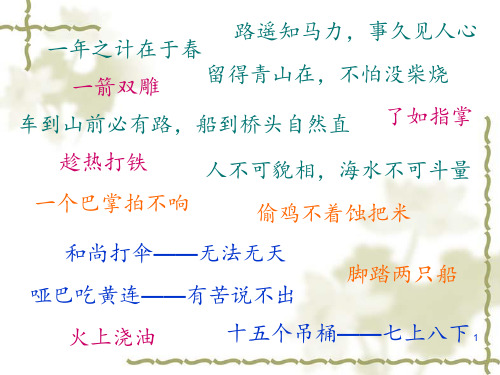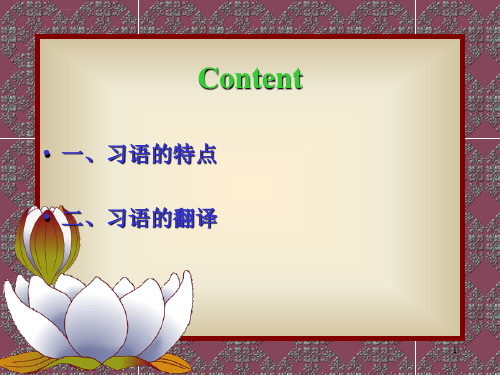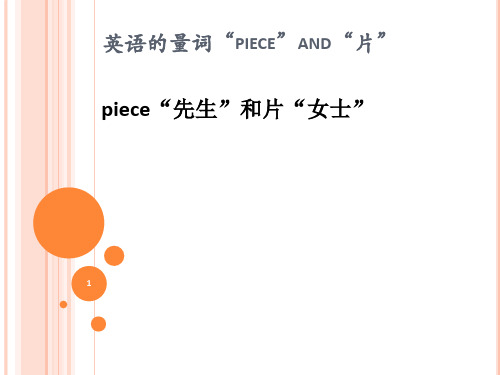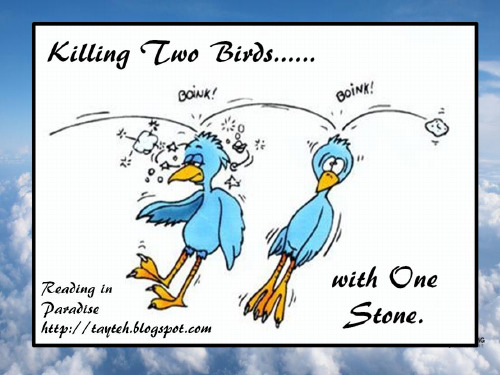英语习语讲解PPT课件
习语外来语的翻译ppt课件

译者作字面的理解。如“to drain the radiator”是 个俚语,意思却是“上厕所”。
3
返回章重点退出
英语习语常有字面意义、形象意义或隐含的实际
意义。借形喻义,形成了独具本民族风格的文化意象,
除非汉语中碰巧也有借同样的形象比喻相同的意义的
对等用法,否则这样的习语是很难完好无损地转换成
汉语的。比如英语里有这样一个习语“poke one’s nose into something”,从字面上看好像可以解 释为“把鼻子伸到某样东西里去”,其实这个习语隐
煽风点火
to turn a deaf ear to
充耳不闻
to have a well-oiled tongue 油腔滑调
a gentleman’s agreement 君子协定
返回章重点退出
an eye for an eye, a tooth for a tooth 以眼还眼,以牙还牙
Practice makes perfect. 熟能生巧。
to pull the wool over one’s eyes 掩人耳目
to open Pandora’s box 打开潘多拉盒子(引起疾病、罪恶、疯狂等各种祸患)
15
返回章重点退出
10. 1. 4 意译法 (Free Translation)
意译法就是忠实于原文的内容,又不拘泥于原文 的形式而采用的按原文意思翻译的一种译法。意译法 也属于归化译法(domestication)。英语中有些习语 无法直译或直译后使人无法理解,在汉语中又找不到 同义对等的习语套译,也不能再现英语的表达形式, 这时只有放弃原文习语的形象和风格,根据上下文, 灵活地传达原作的内容。“意译时等值关系是在各 ‘级’之间自由变换的,甚至可以超过句子这一 ‘级’”。其好处是经过曲径探幽,形式改变,内容 忠实。例如:
英语习语的翻译微课[优质ppt]
![英语习语的翻译微课[优质ppt]](https://img.taocdn.com/s3/m/b2c50412647d27284b73518f.png)
THE TECHNIQUES OF TRANSLATING IDIOMS
3.释义法(意译改造法)
• 在直译和加注无法翻译原文习语时可考虑采用释 义法,牺牲原文比喻形象,只保留其意义。
THE TECHNIQUES OF TRANSLATING IDIOMS
3.英语习语与汉语习语看似相同,实则不相同
• pull one's leg • a walking skeleton • eat one's words
欺骗或戏弄某人 骨瘦如柴的人 承认说错;收回前言
THE COMPARISON & CONTRAST
4.英语习语在汉语中找不到相对应的习语
• child's play • soft soap • oil and vinegar
趁热打铁 身教胜于言传 在某人鼻子底下 武装到牙齿 挤得象沙丁鱼罐头
THE TECHNIQUES OF TRANSLATING IDIOMS
1.直译法(对等翻译法)
• I ask you before you play your last card and destroy me, to consider where you will be without me. • 在你们还没有摊出最后一张牌来毁我之前,我请你们好好 想想,没有我,你们的地位会怎样。
非常容易做的事 奉承;讨好的言行举止 截然不同的东西
3
THE TECHNIQUES OF TRANSLATING
IDIOMS
THE TECHNIQUES OF TRANSLATING IDIOMS
直译法
直译加注法
汉译英--习语翻译PPT课件

.
2
➢ Idioms: (in broad sense may include): set phrases, proverbs, sayings, epigrams, slang expressions, colloquialisms, quotations, twopart allegorical sayings
火上浇油 to pour oil on the flames / add fuel to the flames
滴水石穿 Constant dropping wears the stone.
浑水摸鱼 to fish in the troubled waters
自吹自擂 blow one's own trumpet
➢ 习语(又称熟语):短语,成语,俗语,谚语, 格言,箴言,名言(引语或语录),警句,隽语, 俚语,粗话,行话,歇后语(包括双关语)
.
3
Features of Idioms
➢ 英汉习语的共同特征:
➢ 1、习语是一个民族的语言中最为精彩的一章,是民族文化的瑰宝与结晶。
➢ 2、习语是语言中独立、不规则而固定的因素,往往以短语或短句的形式 出现在句中,在句中多半是当做一个成分使用,有时它的作用就等于一 个词。它的意义往往不等于它的组成分子(单字)意义的总和。
➢ at sixes and sevens, spick and span, then and there
➢ through thick and thin
➢ tit for tat
➢ neither fish, flesh or fowl
➢ Care killed the cat.
➢ Money makes the mare to go.
《英语习语的翻译》PPT课件

Johnson obviously knows this street like the back of his hand.
显然约翰逊对这条街了如指掌。
精选课件
13
under one’s nose armed to the teeth packed like sardines sour grapes a gentleman’s agreement the Trojan horse the heel of Achilles the sword of Damocles the cold/hot war
None of his children have any love for the old man. They would be pleased if he kicked the bucket tomorrow.
他的子女对老头子全都毫无感情。他们巴不得他明天 就翘辫子。
teach one’s grandma to suck eggs. ([美国俚语];令人讨 厌;蹩脚)
15% percent of the nation's largest companies have installed "golden parachute"* for top
management because of the recent upsurge in
hostile corporate takeover bids.
精选课件
21
5)Among so many well-dressed and cultured people the country girl felt like a fish out of water.
英语习语解析

三、英语习语的分类
〔Classification of Idioms〕
英语习语的分类方法有多种,不同的分类标准,产生 不同的结果。根据习语所涉及的不同主题,把习语 分为:
① 与鸟类、动物名称有关的习语,如:
bird of a feather 〔一丘之貉〕,to kill two birds with one stone〔一举两得〕,like water off a duck’s back 〔毫无效果〕,the cart before a horse 〔本末倒置〕。
Idioms〕
了解了习语的分类,尤其是根据习语的语法功能和构造 进展分类之后,可以使我们更加恰当地运用习语。但 是准确地使用习语,还要了解习语的文体特点、修辞 特点以及其偶然的变化等。
〔一〕文体特点〔Stylistic features〕
大量的习语都是各行各业劳动人民智慧的结晶。因而习 语也就带上了它的文体特点,有些习语是非正式的用 语,带有很强的口语性和俚语性,不适于在正式场合 使用;而有些习语极其正式,用于十分固定的文体中; 而其它的习语那么失去了其文体差异,字典里也不再 标明其文体特征。
4.许多习语在语法上是不可分析的。比方blow hot and cold 〔摇摆不定〕,play fast and loose〔玩弄,反复无常〕,
从语法上来讲都有问题,因为形容词是不能修饰动词的。 还有like attracts like〔物以类聚〕,on the go〔忙个不停; 活泼着〕等从语法上来讲都有问题。
英语习语解析
一、英语习语〔English Idioms〕
❖ 英语习语〔English Idioms〕,是我们通常所讲的英语 成语。广义地说,习语泛指一种民族语言中的惯用法 和特殊表达方法;而狭义的习语,那么是指英语中长 期以来习用的,表达完善意义的、构造定型的固定词 组和短句。
英语谚语习语总结ppt课件

• 他论事不论人
• he see things not people
• 我们志同道合
•
we sang the same songs
• 我希望你也能来
•
I hope you in the roll
• 我们各付各的吧
•
let’s go Dutch
• 说曹操, 曹操就到
•
speak of the devil
• 千里之行始于足下。
• Look before you leap. 三思而后行。
• Pour cats and dogs
Facts speak plainer (清楚,明白) than words. 事实胜于雄辩。
Action speaks louder than words. 行动胜过语言。
Where there is a will, there is a way. (A willful man will have his way. )
can‘t make him drink! 〔谚〕带马到河边容易,逼马饮水难!
Chichen 小鸡 19.Come on! Don’t be chicken! 来,别害怕! 20.Well,she’s certainly no spring chicken .她当然不再是个小丫头了。 21.Don't count your chickens before they're
12. Just hold your horses! 忍耐一下吧! 13. She works like a horse all day long. 她整天辛辛苦苦地干活。 14.That’s a horse of a different color! 那完全是另外一回事。 15.You can take a horse to the water,but you
第四章2英译汉的难点习语的翻译ppt课件

9
经营者提供商品或者服务有欺诈行为 的,应 当按照 消费者 的要求 增加赔 偿其受 到的损 失,增 加赔偿 的金额 为消费 者购买 商品的 价款或 接受服 务的费 用
三、意译法
1)They didn’t invite him, for he is a wet blanket. • 他们没有邀请他,因为他是个令人扫兴的人。
一、习语的特点
• 广义的习语(idioms),包括俗语(colloquialisms)、 谚语(proverbs)和俚语(slang expressions)。
• 英语习语是在英语的发展过程中,经过长期的社会实 践提炼出来的短语和短句,是语言的精华部分。
• 习语大都具有鲜明的形象,适合用来比喻事物,且短 小精悍,易懂易记,为广大人民群众所喜闻乐见。
10
经营者提供商品或者服务有欺诈行为 的,应 当按照 消费者 的要求 增加赔 偿其受 到的损 失,增 加赔偿 的金额 为消费 者购买 商品的 价款或 接受服 务的费 用
四、兼用直译和意译
• The captain scratched the beginnings of five o'clock shadow and look away.
16
经营者提供商品或者服务有欺诈行为 的,应 当按照 消费者 的要求 增加赔 偿其受 到的损 失,增 加赔偿 的金额 为消费 者购买 商品的 价款或 接受服 务的费 用
英语量词习语ppt课件

16
狗——Dog 汉语中常用“狗”比喻人,如“忠实走狗”、 “看家狗”,
成语“狗苟蝇营”等。在英语中除了喻人外,还有丰富多彩 的词组、的谚语等。 dog作名词时指无赖汉,坏蛋、的废物,不受喜爱(或欢迎) 的人。有时加形容词修饰可指各种人,如: You dirty dog !你这个坏小子! a lucky dog.幸运儿; a dumb dog.沉默不语的人, a sly dog.暗中寻欢的人和暗地里偷鸡摸狗的人;
5
MISS 片
a flood of moonlight 一片月光
a flood of light
一大片强光
a blade of grass
一片草叶
a beautiful stretch of field 一片美丽的原野
a blanket of snow
一片白雪
a scene of great rejoicing 一片欢腾
nomination.那个无名小卒在竞争中获胜时,投票者无不大吃 一惊。
14
羊——Sheep 英语中指害羞而忸怩的人,胆小鬼,驯服的人。有关sheep的
谚语不少。 1. As well be hanged for a sheep as a lamb.偷羊偷羔都是绞
(死);偷大偷小统是贼(意指:一不做,二不休)。 2. There’s a black sheep in every flock.每一羊群里都会有一只
a piece of music
一首(支)乐曲
a piece of jewelry
一件珠宝
a piece of mail
英语习语课件

一、动物词汇的新用法 1.white elephant 累赘,大而无用的东西
I’ll never buy a car, for it’s only a white elephant to me.
black in the face 满脸怒气
look black 怒目而视
Blue Monday指“沮丧的星期一”,
blue blood指贵族血统
Blue
1. I’m feeling rather blue today. 我今天情 绪低落。 2. Things looked blue. 事情看来没希望了。
3.to keep body and soul together 维持生存
When I left home, work was difficult to find, and I earned hardly enough to keep body and soul together.
四、专有名词的新用法
三、人体部位词汇的新用法
嘲弄、戏弄某人 1.pull someone’s leg You’re pulling my leg! Do you really expect me
to believe such nonsense?
2.to make one’s blood boil” 让某人大发雷霆
It makes my blood boil to see how people are ruining the countryside.
熟睡
1.duck's egg 得零分 2.a sleeping dog 不可惹、惹不起的人 3.When pigs fly. 决不可能! 4 .Teach fish to swim. 班门弄斧。 5.Dog doesn't eat dog. 同行不相妒 6.kill two birds with one stone 一石双鸟,一箭双雕 7. When the cats are away the mice will play. 山中无老虎,猴子称霸王
《英语习语的翻译》PPT课件

One’s ability falling short of one’s wish
To rob Peter to pay Paul
四、意译法
In good fight
竞技状态 良好 伤人感情 惹人生气
Rule of thumb
单凭经验来 做的方法
Draw blood
To pull the wool over one’s eyes
扫兴的人 或东西 采取回避 政策
Bury one’s head in the sand
A soldier of fortune
Have a bee in one’s bonnet ( 头饰) Hang on somebody’s lops To have other fish to fry
胡思乱想
人多碍事 食品仓库 老鼠多, 贪食者 病痛多。
大山出小鼠
To put one’s eggs in one basket
孤注一掷
The houses stored with food are full of mice, the bodies of gluttons(食量大的 人) are full of diseases.
“简单的东西” 或 “很容易做的事” 对! Eat one’s words “食言”
错!
对!
“承认自己说了错话”
Dog-eat-dog “狗咬狗” 错! “残酷争夺” 或 “人吃人的事” 对! to go home “回家”
错!
“击中要害” 或 “产生影响” 对!
To wash one’s hand
Be full of beans
To butter someone up
To cry over split milk To have a bone to pick with someone To have a finger in the pie
英语习语谚语 优质课件

3、斯堪的纳维亚风暴 公元790年开始,斯堪的纳维亚人入侵英国,并在英国
大批定居,他们讲的是北日耳曼语, 是现在的瑞典语、 芬兰语、挪威语和冰岛语的前身。在此后的二百年中, 许多斯堪的纳维亚各族语言(北日耳曼语)的词语渗入英 语词汇。据估计,现代英语中约有900个斯堪的纳维亚
三、宗教影响
现代英语中大量习语, 源于宗教活动、仪式和《圣经》 故事。可以说,任何一本英文著述中,如果不包含直接源 于《圣经》的词句,几乎不可能。几百年来,《圣经》已 然成为英美每一个家庭必备的读物。圣经》中的许多 句子和短语被人们广为传颂,久而久之就成了习语。如 : Drop in the bucket/ocean 沧海一粟。 eye for eye and tooth for tooth 以眼还眼,以牙还牙
2、条顿人的征服 条顿人即居住在西北欧的3个日耳曼部落, 他们是盎格
鲁人、萨克逊人和朱特人。约在公元449 年, 他们开始 征服不列颠。他们的入侵给英语带来了极大的影响, 并 最终形成盎格鲁-萨克逊语, 即现代英语的起源。条顿人 的征服对英语的影响是全面的, 起决定作用的, 从很多英 语习语还可以找到条顿人征服的影子。如 cut someone to the quick 意为大伤某人的感 情, quick 这里指皮肉,这个解释源于古撒克逊语。
Welcome, everyone!
My boyfriend loves football, but it's not my cup of tea.
Welcome to the world of happy idioms!
Introduction
英语习语翻译PPT课件

Overview of courseware content
Content overview: The courseware covers a wide range of English periods, organized mathematically for easy navigation and learning Each period is explained in detail, with examples and translations provided to aid understanding
legal wealth and cultural heritage
03
Translation Theory and Methods
Introduction to Translation Theory
Definition of Translation
The process of rendering the meaning of a text from one language into another, taking into account cultural and contextual factors
Interactive exercises: The courseware includes interactive exercises that allow learners to practice using and interpreting periods in context These exercises are designed to be engaging and challenging, and provide immediate feedback to help learners improve their skills
习语PPT

英语习语,常用语分类一.英汉习语所用设喻相似而意义相近的二.英汉习语所用设喻形象各异,意义英汉习语所用设喻形象各异意义却相近的三.英汉习语所用设喻形象相似而不可望文生义的1一.英汉习语所用设喻相似而意义相近的1 Great minds think alike.英雄所见略同;2 Courtesy costs nothing.礼多人不怪;2 Courtesy costs nothing3 Lovers‘ quarrels are soon mended.夫妻无隔夜仇;4 The higher up, the greater the fall. 攀高跌重:4 The higher up the greater the fall5 know something like the palm(手掌) or back of one’s hand 了如指掌;6 constant dropping wears the stone 滴水穿石;7 fish in troubled water 混水摸鱼;8 Great oaks(橡树)from little acorns(橡子) grow. 合抱之木,生于毫末;合抱之木生于毫末;9 pour oil on the flame火上加油;10 Give somebody an inch and he‘ll take an mile. 得寸进尺;得寸进尺11 lie down on the job. 工作上一事无成;12 Strike while the iron is hot. 趁热打铁;213W ll h13 Walls have ears.隔墙有耳;14 The tailor makes the man. 人靠衣服马靠鞍;15a yes man 应声虫(跟屁虫);a yes man16at one‘s wit’s end 才穷智尽17hang by a thread 千钧一发;18plain sailing 一帆风顺;19follow in sb‘s footsteps 步人后尘;20bite off more than one can chew 贪多嚼不烂;bite off more than one can che 贪多嚼不烂21The spirit is willing but the flesh is weak. 心有余而力不足;22wash one‘s hands of 洗手不干;23Beauty is in the eye of the beholder(旁观者). 情人眼里出西施24run sb. to earth 钻入地缝也要抓到某人;25skin deep 肤浅。
《英汉习语翻译》PPT课件

(3) A dog in the manger
源于《伊索寓言》,说的是一条狗一天睡在 放有稻草的马槽里,狗是不吃草的动物,而 当马或牛一走进稻草时,这条狗却朝着马或 牛狂吠,不准食草动物享用。该习语用来讽 刺那些占据着职位却不做事的人或那些自私 的人占有某些东西,却不使用,又不肯与人 分享。
(2)keep one’s powder dry (保持火 药干燥)
出自十七世纪,英国独裁政客奥利弗·克伦 威尔(Oliver Cromwell)出征爱尔兰,渡 河攻击前对部队说“Put your trust in God;but be sure to keep your powder dry。”(笃信上帝,但不要忘记, 保持火药干燥)现用来指“做好准备”、 “有备无患”。
2. 源于寓言故事
寓言起源于民间口头创作,多采用以小喻大、 借古喻今的创作手法,把复杂深刻的道理寄 寓在浅显的故事中,后来发展成为文学创作 中的一种体裁。英语许多习语就是出自这些 寓言故事并流传至今。
(1)fish in troubled waters
出自《伊索寓言·击水的渔夫》,渔夫在河里拦河 张网捕鱼,用麻绳缠住石块,再不停地打击河水, 吓得鱼群仓皇逃窜,都钻进了他的网中。附近的一 个人见到后,指责他这样把河水弄浑,大家都没清 水喝了。渔夫回答说:“若不搅浑河水,我就非饿 死不可。”因此,人们常用to fish in troubled waters 比喻趁乱去为自己捞取好处。在英语中, to fish in troubled waters 也可写成to fish in the muddy wate圣经
《圣经》塑造了西方人的价值观和伦理,要 了解西方文明,就得去读《圣经》。有人统 计,当今世界大约有10亿人把圣经当成他们 的精神食粮。因此,英语语言中有不少习语 来自《圣经》。
- 1、下载文档前请自行甄别文档内容的完整性,平台不提供额外的编辑、内容补充、找答案等附加服务。
- 2、"仅部分预览"的文档,不可在线预览部分如存在完整性等问题,可反馈申请退款(可完整预览的文档不适用该条件!)。
- 3、如文档侵犯您的权益,请联系客服反馈,我们会尽快为您处理(人工客服工作时间:9:00-18:30)。
The official blundered out government secrets again. 不慎泄漏,顺口说出
.
7
(2) 动词 + 介词
如:a. Why are they always biting at each other?
朝…吼叫
b. She cut across our talk. 打断
(3) 动词 + 副词 + 介词
如:a. The products of Japan are gradually edging those of the United States out of the European market. 逐渐排除去
短语动词既可看作习语,也可不作习语对待,视 上下文而定。 如:He took off his shoes.
He took off the comedian to perfection.?
There are ten dark horses in the stable.
Whatever the outcome of the election, he is still a
d. He killed time by reading a newspaper while
waiting for the bus.
消磨时间
.
9
3. 动词 + 介词短语 如:beat about the bush, fall by the way
a. He amuses himself by setting other people by the ears. 引起纷争,挑拨离间
组成部分是固定的,不可任意拆开或替换。
如:on board
在船上
on the board 在会上讨论
on the boards 登台做演员
in the same boat None of your sauce!
Diamond cut diamond, crook cut crook.
Like cures like.
b. I think that man is just hanging out for a better offer. 故意拖延以待
.
8
2. 动词 + 名词
如:
bide one’s time, blaze the trail, hang fire
a. When the story of the barber’s ill-treatment
b. He took the boy to the station and set him on his way. 给某人指明路途
c. My mother packed some food for the beggar and giving him a shilling, set him on his way. (给予帮助后)送某人上路
5. 动词 + 名词 + 介词 如: make short work of,
make a clean breast of get wind of, pick holes in
.
11
6. 动词 + 形容词 如:go easy, come clean, sit pretty
a. We have set apart a special sum of money for new equipment.
如:do sb. brown, do up brown,
show the white feather,
to have an axe to grind
Friday face,
hard names.
under the weather
.
4
b. 结构的固定性(structural stability)
从结构上来看,习语也有本身的完整性,其中各个
.
2
狭义上:一种语言中长期以来习用的、表达 完整意义的、结构定型的固定词组 或短句。“习语、熟语、惯用法”
.
3
I. 英语习语的特征
英语习语有两个特征:
a. 语义的统一性(semantic unity)
习语是个固定的词组,在语义上是个不可分 割的统一体,其整体的意义往往不能从组 成习语的各个词汇意义中揣测出来。
英语习语
.
1
英语的idiom一词语义范围:
广义上:idiom泛指一种民族语言中所有的习惯用 法和特殊表达方法,可以是一个词,也 可以是一个词组或句子。
Idiom:A form of expression peculiar to a
language, person, or group of people. ------COD 简明牛津词典
of his wife got wind, he left town. 泄漏,传播
b. Its slow service gave the restaurant a bad name. 使……名声不好
c. The police gave him the collar as he was
leaving the apartment. 逮捕,抓获
dark horse.
.
6
II. 英语习语的分类
从语法功能和结构成份来看,习语可分为:
一、动词性习语 动词性习语(idioms verbal in nature)以动词为中心与其 他动词搭配使用,在句中起谓语作用。 动词性习语有以下几种结构: 1. 动词 + 小品词(verb + particle)
※ to tread/ walk on air 洋洋自得,飘飘然
.5英语习语Fra bibliotekidioms 与自由短语free phrase 的区别
自由短语(free phrase)可从其组成部分的字面意义 来判定其释义。英语习语则不尽然。 如:red tapes, cold winter.
red tape, cold comfort.
.
10
4. 动词 + 名词 + 介词短语 如:burn the candle at both ends
catch a hare with a tabor 试图作几乎不可能做到的事 He spent all his life in dropping buckets into empty wells.
